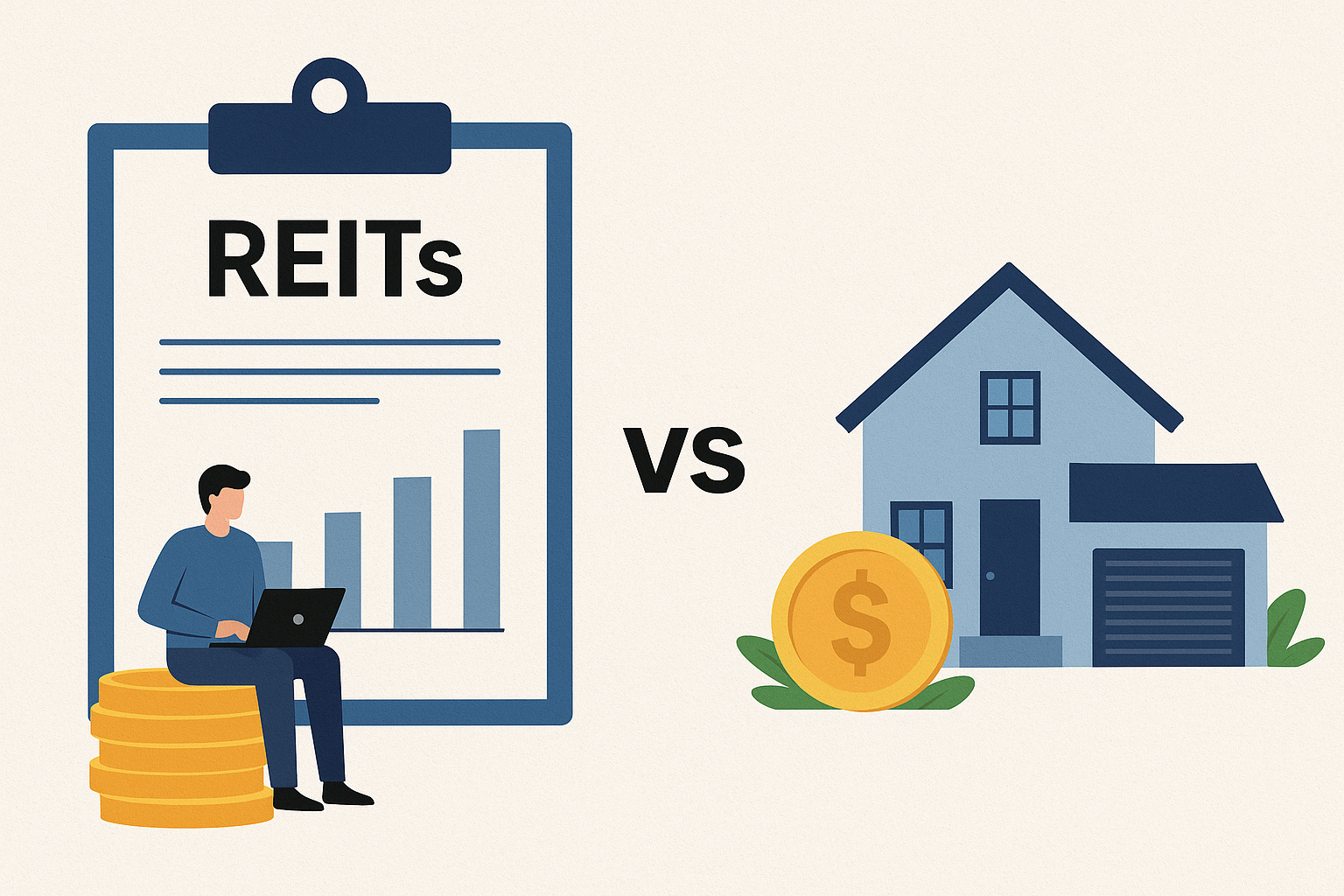Introduction
REITs vs. Real Estate: Where Should You Invest? Investing in real estate has long been considered a cornerstone of wealth-building strategies. Whether it’s buying property for rental income or long-term appreciation, the tangible nature of real estate offers a sense of security to many investors. But in recent years, REITs (Real Estate Investment Trusts) have emerged as a compelling alternative.
The question is no longer just “Should I invest in real estate?” but also “Should I consider REITs instead?” Each option comes with its own risk profile, level of involvement, and potential returns. In this article, we’ll break down both avenues, discuss their pros and cons, and help you decide which path aligns best with your financial goals.
Table of Contents
What Are REITs?
REITs are companies that own, operate, or finance income-generating real estate. These trusts pool investor money to buy properties such as office buildings, apartments, shopping malls, and hospitals. Investors buy shares in a REIT and receive dividends generated from the income the properties produce.
You can think of a REIT like a mutual fund, but instead of investing in stocks or bonds, it invests in real estate. There are publicly traded REITs that you can buy on stock exchanges, and there are private REITs which are less liquid and typically accessible through brokers or investment platforms.
👉 Learn more about REITs from Nareit.org.
Traditional Real Estate Investment
This is the method most people are familiar with—buying physical property. Whether it’s a residential home, an apartment building, or commercial property, traditional real estate investing involves purchasing, owning, and managing the asset.
Investors make money in two primary ways: appreciation (when the value of the property increases) and rental income. The involvement here is typically hands-on, especially if you’re managing tenants or handling repairs yourself.
Pros and Cons of REITs
✅ Pros
- Liquidity: REITs are traded like stocks. You can buy or sell your shares anytime.
- Diversification: With one investment, you can gain exposure to various property types across different locations.
- Passive Income: You receive regular dividends without the responsibility of property management.
- Lower Entry Cost: You can start investing in REITs with as little as a few hundred rupees or dollars.
❌ Cons
- Limited Control: You’re not choosing the specific properties being bought or sold.
- Market Volatility: Public REITs can be affected by broader stock market swings.
- Dividend Taxes: Dividends from REITs are typically taxed as regular income, not capital gains.
Pros and Cons of Traditional Real Estate
✅ Pros
- Tangible Asset: You physically own the property.
- Leverage: You can use borrowed money to amplify returns.
- Tax Benefits: Mortgage interest and depreciation can offer tax deductions.
- Full Control: You choose the property, the tenants, and the improvements.
❌ Cons
- High Entry Cost: You need a substantial down payment to get started.
- Illiquidity: Selling a property can take weeks or months.
- Management Headaches: Dealing with maintenance, tenant issues, and regulations can be stressful.
- Market Risk: Real estate prices can decline, and rental demand can fluctuate.
Key Factors to Consider Before Choosing
1. Your Time Commitment
- REITs are ideal if you prefer a hands-off investment.
- Real estate demands time, attention, and sometimes professional management.
2. Capital Available
- If you’re starting with limited funds, REITs offer an easier entry point.
- Traditional real estate usually requires a down payment, closing costs, and reserves for emergencies.
3. Risk Tolerance
- Public REITs are subject to market volatility but are diversified.
- Real estate is less volatile in price but has liquidity risk and concentration risk (you’re likely investing in one or two properties at most).
4. Income Goals
- REITs generally offer steady dividend income.
- Rental income can be higher but may come with periods of vacancy or tenant issues.
A Real-World Example
Imagine two investors—Ravi and Meera.
- Ravi decides to buy a small apartment and rent it out. He puts in 20% as a down payment, handles tenant calls, and pays a property manager to deal with issues. Over time, his property appreciates, and he earns rental income, though some months are unpredictable due to repairs and vacancies.
- Meera, on the other hand, buys shares in a diversified REIT that owns shopping malls and commercial buildings. She receives a steady dividend every quarter and doesn’t need to lift a finger, but she notices her REIT shares fluctuate during market downturns.
Both investors are technically in real estate, but their journeys and risk exposure are very different.
Tax Considerations
Tax treatment varies significantly between the two.
- REIT dividends are typically taxed as ordinary income. In India, REITs are regulated by SEBI and are subject to specific dividend and interest taxation rules. More info from SEBI.
- Rental income is also taxable, but property owners can claim deductions like interest on home loans, repairs, and depreciation.
Always consult with a tax advisor for personalized advice, especially if you’re balancing both options.
REITs and Real Estate in a Portfolio
Who says you have to choose one over the other?
Many savvy investors diversify by allocating part of their portfolio to REITs and another portion to direct property investment. This strategy allows them to benefit from stable dividends and long-term appreciation, while also mitigating the risks tied to just one approach.
For example, you might invest 70% in real estate properties for long-term wealth generation and 30% in REITs for income and liquidity.
Conclusion
So, REITs vs. Real Estate—where should you invest?
There’s no one-size-fits-all answer. If you’re someone who prefers passive income, low maintenance, and liquidity, REITs could be your ideal pick. But if you value control, long-term capital growth, and tax advantages, traditional real estate may suit you better.
Ultimately, the right choice depends on your financial goals, lifestyle, and risk tolerance. And for many, a combination of both can offer the best of both worlds.
Find more Finance content at:
https://allinsightlab.com/category/finance/

